Current News
February 2026
Mirco Starts as Ph.D.
On the 2nd, Mirco Schwarz started work as a Ph.D. student in our group. Mirco joined the group in August 2024 to pursue his Master thesis. He worked on the fabrication and mechanical characterization of doubly-clamped CrSBr nanobeams. He investigated the effects of laser-induced heating and modeled the system using an extended Euler-Bernoulli beam theory incorporating buckling, imperfections, non-local strain, and thermal stress. After successfully defending his Masters in September of 2025, he decided to join the group as a Ph.D. student. Welcome back Mirco!
January 2026
Torqe Magnetometry of an Individual Magnetotactic Bacterium
On the 30th, Phys Rev. E published our paper entitled, Magnetic properties of an individual Magnetospirillum gryphiswaldense cell, which reports on torque magnetometry measurements on an individual magnetotactic bacterium.
Many bacteria share the fascinating ability to sense Earth’s magnetic field—a process known as magnetotaxis. These bacteria synthesize magnetic nanoparticles, called magnetosomes, within their own cell body and arrange them to form a linear magnetic chain. The chain, which behaves like a compass needle, aligns the microorganisms with the geomagnetic field. In our paper, we present measurements of the magnetic hysteresis of an individual bacterium of the species Magnetospirillum gryphiswaldense via ultrasensitive torque magnetometry. These measurements, in combination with transmission electron microscopy and micromagnetic simulations, reveal the magnetic configurations of the magnetosomes, their progression as a function of applied field, as well as the total remanent magnetic moment and effective magnetic anisotropy of a chain within a single bacterium. Knowledge of these properties is crucial both for understanding the mechanisms behind magnetotaxis and for the design of systems exploiting magnetotactic bacteria in biomedical applications.
The project was initiated and led by research scientist Dr. Boris Groß. Experiments and analysis were done by Ph.D. student Mathias Claus with contributions from Dr. Marcus Wyss at the Nano Imaging Lab of the Swiss Nanoscience Institute. Prof. Dirk Schüler (University of Bayreuth) provided the bacteria and contributed his expertise in this area.
Group Members at Swiss Quantum Days
From the 26th to the 30th, group members attended the Swiss Quantum Winter School and Swiss Quantum Days in Engelberg, Switzerland. Prof. Poggio gave a talk at the school on the morning of Tuesday the 27th entitled, “Imaging Quantum Magnetism”. From Wednesday the 28th to Friday the 30th, post-doctoral researcher Dr. Lorena Niggli, and Ph.D. students Antonella Restino and Katharina Kress attended the conference. Lorena and Katharina presented posters entitled, “Imaging vdW magnets and magnetic devices in the 2D limit” and “Probing the magnetic order in a few-layer CrPS4“, repectively.
Group Ski Trip
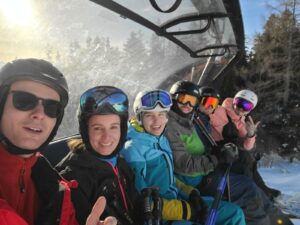 On Wednesday the 14th, 14 group members and 2 guests traveled to Crans-Montana, Switzerland for a group ski trip. We stayed until Friday the 16th, sking, hiking, and spending time together in the lodge. The program included a group brainstorming session on Thursday evening, in which we tried to come up with initiatives to improve our work or solve persistent problems in the lab. Thanks especially to Ph.D. student Loris Durante for organizing!
On Wednesday the 14th, 14 group members and 2 guests traveled to Crans-Montana, Switzerland for a group ski trip. We stayed until Friday the 16th, sking, hiking, and spending time together in the lodge. The program included a group brainstorming session on Thursday evening, in which we tried to come up with initiatives to improve our work or solve persistent problems in the lab. Thanks especially to Ph.D. student Loris Durante for organizing!
Lorena Gives Endress Seminar
On the 13th, post-doctoral researcher Dr. Lorena Niggli gave the Georg H. Endress Research Seminar in Freiburg, Germany. Her talk was entitled, “Imaging vdW magnets and magnetic devices in the 2D limit”, and covered how imaging 2D vdW magnets with two specialized techniques – scanning superconducting quantum interference device microscopy and nanowire magnetic force microscopy – allows one to investigate the mechanisms stabilizing long-range magnetic order in the two dimensional limit.
Katharina at Conference in Saas Fee
From the 4th to the 9th, Ph.D. student Katharina Kress attended the Condensed Matter Physics in the Alps conference in Saas Fee, Switzerland. The conference convered geometric frustration, topology, flat bands, and correlation in Kagome and van der Waals systems. On Wednesday afternoon, Katharina presented a poster entitled, “Probing the magnetic order in a few-layer CrPS₄”.
December 2025
End-of-year Dinner
On the evening of the 18th, group members, alumni, and friends met for the annual end-of-year dinner. For a second time, the event took place at Pizzeria Dio Mio in downtown Basel. With over 30 people present including current and former group members and friends, everyone enjoyed eating, drinking, and lively conversations. Hope to see you all again next year!
Luca Defends Ph.D.
On the 17th, Luca Forrer defended his Ph.D. thesis entitled, “Scanning multi-gate and scanning quantum dot microscopy”, earning his doctorate in physics summa cum laude. The defense was chaired by Prof. Patrick Maletinsky with Prof. Peter Grütter (McGill), Prof. Dominik Zumbühl, Dr. Floris Braakman, and Prof. Poggio making up the committee of experts. Luca earned his Bachelors and Masters degrees in Nanoscience from the University of Basel. He started working in our lab on a joint project with Prof. Zumbühl funded by the Swiss Nanoscience Institute in March 2021.
An aperò including group members, friends, and family as well as delicious delicacies from Luca’s home canton of Glarus took place in the department mensa. Congratulations Dr. Forrer!
Dávid Starts in the Group
On the 1st, Dr. Dávid Hovančík started work as a post-doctoral researcher in our group. Dávid earned his Bachelors and Masters in Physical Engineering of Progressive Materials from the University of Presov in Slovakia in 2019 and 2021, respectively. He then moved to Charles Univeristy in Prague, earning a Ph.D. in Mathematics and Physics in 2025. There he worked as a experimental condensed matter physicist on magnetism and its interaction with light and lattice vibrations. In 2024, he won a Fullbright Fellowship and visited the group of Prof. Xiaodong Xu at the University of Washington, USA between 2024 and 2025. Welcome Dávid!
November 2025
Paper on Advanced SQUID-on-lever Published in PR Applied
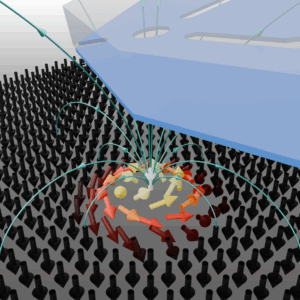 On the 14th, Physical Review Applied published our paper entitled, Advanced SQUID-on-lever scanning probe for high-sensitivity magnetic microscopy with sub-100-nm spatial resolution as an ‘Editor’s Suggestion’. Superconducting quantum interference devices (SQUIDs) are exceptionally sensitive magnetometers, capable of detecting weak magnetic fields. Miniaturizing these devices and integrating them onto scanning probes enables high-resolution imaging at low temperatures. In this work, we demonstrate the fabrication of nanometer-scale niobium SQUIDs with inner-loop sizes down to 10 nm at the apex of individual planar silicon cantilevers via a combination of wafer-scale optical lithography and focused ion beam (FIB) milling. These robust SQUID-on-lever probes overcome many of the limitations of existing devices, achieving spatial resolution better than 100 nm, magnetic flux sensitivity of 0.3 μΦ0/√Hz, and operation in magnetic fields up to about 0.5 T at 4.2K. Nanopatterning via Ne- or He-FIB milling allows for the incorporation of a modulation line for coupling magnetic flux into the SQUID or a third Josephson junction, for shifting its phase.
On the 14th, Physical Review Applied published our paper entitled, Advanced SQUID-on-lever scanning probe for high-sensitivity magnetic microscopy with sub-100-nm spatial resolution as an ‘Editor’s Suggestion’. Superconducting quantum interference devices (SQUIDs) are exceptionally sensitive magnetometers, capable of detecting weak magnetic fields. Miniaturizing these devices and integrating them onto scanning probes enables high-resolution imaging at low temperatures. In this work, we demonstrate the fabrication of nanometer-scale niobium SQUIDs with inner-loop sizes down to 10 nm at the apex of individual planar silicon cantilevers via a combination of wafer-scale optical lithography and focused ion beam (FIB) milling. These robust SQUID-on-lever probes overcome many of the limitations of existing devices, achieving spatial resolution better than 100 nm, magnetic flux sensitivity of 0.3 μΦ0/√Hz, and operation in magnetic fields up to about 0.5 T at 4.2K. Nanopatterning via Ne- or He-FIB milling allows for the incorporation of a modulation line for coupling magnetic flux into the SQUID or a third Josephson junction, for shifting its phase.
Such advanced functionality, combined with high spatial resolution, large magnetic field range, and the ease of use of a cantilever-based scanning probe, extends the applicability of scanning SQUID microscopy to a wide range of magnetic, normally conducting, superconducting, and quantum Hall systems. We demonstrate magnetic imaging of skyrmions at the surface of bulk Cu2OSeO3. Analysis of the point spread function determined from imaging a single skyrmion yields a full width at half maximum of 71 nm. Moreover, we image modulated magnetization patterns with a period of 65 nm.
The work was a close collaboration with the group of Prof. Dieter Kölle (Tübingen). Dr. Armin Knoll (IBM Zürich) and colleagues fabricated the custom designed cantilever probes, the Cu2OSeO3 crystal was provided by Dr. Arnaud Margez (EPFL) and colleagues, and the superconducting device layer was made by Dr. Oliver Kieler (PTB). In our own group, the work was led by recent Ph.D. graduate Dr. Daniel Jetter with contributions from Ph.D. student Katharina Kress, and post-doctoral researcher Dr. Andriani Vervelaki. Research scientist Dr. Boris Groß worked on the micromagnetic simulations. The work was made possible by our FET Open project FIBsuperProbes. Read more about it on the SNI news site.
Paper on Imaging Twisted van der Waals Antiferromagnet Published
On the 14th, ACS Nano published a paper entitled, Imaging magnetic switching in orthogonally twisted stacks of a van der Waals antiferromagnet, on which we collaborated. The article discusses experiments on orthogonally twisted stacks of the van der Waals antiferromagnet CrSBr, aiming to exploit an extreme misalignment of magnetic anisotropy across the twisted interface. Stacking van der Waals magnets holds promise for creating new hybrid materials with properties that do not exist in bulk materials. Using nitrogen-vacancy center microscopy, our collaborators constructed vector maps of the magnetization, and tracked their evolution under an external field, in a range of orthogonally twisted compensated and uncompensated configurations differing by the number of layers. They showed that twisted stacking consistently modifies the local magnetic switching behavior of constituent flakes, and that these modifications are spatially nonuniform.
Research scientist Dr. Boris Groß carried out the micromagnetic simulations used in the analysis of the experiments. The work was a collaboration with Prof. David Broadway (RMIT) and colleagues.
October 2025
EuraMet Project Review Meetings
This month, group members attended mid-term meetings for our two EuraMet projects, MetSuperQ and QuAHMET. Research scientist Dr. Floris Braakman, and Ph.D. students Loris Durante and Antonella Restino attended the MetSuperQ meeting in Gran Sasso, Italy from the 14th to the 17th. Floris, research scientist Dr. Paritosh Karnatak, post-doctoral researcher Dr. Damien Richert, and Prof. Poggio attended the QuAHMET meeting in Würzburg, Germany from the 29th to the 30th. Floris gave a talk during the meeting.
MetSuperQ aims to develop tools meant to address challenges in scaling up superconducting qubits. These new tools will underpin further engineering advances and allow for accurate characterization of qubits and materials, as well as manipulation and read-out. QuAHMET focuses is on the traceable measurement and characterization of quantum anomalous Hall effect materials as devices and primary resistance standard candidates. EuraMet (European Association of National Metrology Institutes) is a collaborative alliance of national metrological organizations from member states of the European Union and of the European Free Trade Association (EFTA) whose purpose is to achieve higher efficiency by co-ordinating and sharing metrological activities and services.
Lukas and Daniel Earn their Ph.D
On the 23rd, for the first time in group history, two doctoral students defended their thesis on the same day.
In the morning, Ph.D. student Lukas Schneider defended his thesis entitled, “Magnetic force microscopy with a nanowire cantilever”, earning his doctorate in physics summa cum laude. The defense was chaired by Prof. Richard Warburton with Prof. Arnaud Gloppe (Strasbourg), Prof. Ernst Meyer, and Prof. Poggio making up the committee of experts. Lukas earned his previous degrees from the University of Basel, working in our lab as a Masters student starting in September 2019. Congratulations Dr. Schneider!
In the afternoon, Ph.D. student Daniel Jetter defended his thesis entitled, “SQUID-on-cantilever: A hybrid scanning probe for magnetic nano-imaging”, earning his doctorate in physics magna cum laude. The defense was chaired by Prof. Tomasz Smolenski with Prof. Yonathan Anahory (Hebrew University) — via video link — Prof. Patrick Maletinsky, and Prof. Poggio making up the committee of experts. Daniel earned his previous degrees from the University of Tübingen and started working in our lab as a visiting Masters student in January 2020. Congratulations Dr. Jetter!
After the defenses, the two freshly baked doctors of philosophy jointly hosted a lively aperò with group members, friends, and family. Congratulations to all on the great success!
Yonathan Anahory Gives Colloquium
On the 17th, Prof. Yonathan Anahory (Hebrew University) visited our group and gave the department’s colloquium on Prof. Poggio’s invitation. His talk entitled, “Probing magnetic edge states by nanoscale magnetic imaging,” described his most recent experimental work on two-dimensional magnets. During the day, he visited our labs, discussed with group members, and met with members of other groups in the department.
Group Retreat and Workshop in Montafon
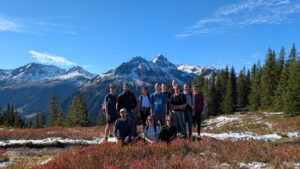 From the 7th to the 10th, 16 group members attended a retreat and workshop at the ‘Sportclub Klein Tirol’ in the alpine village of Vandans, Austria, in the Montafon region along the Swiss border. The get-together was a joint event with the groups of Dieter Kölle and Reinhold Kleiner from the Eberhard Karls University of Tübingen and funded by the Wilhelm and Else Heraeus Stiftung. A four-day program of talks and outdoor events promoted exchanges on superconducting devices, magnetism, force sensing, and opto-mechanics. Reinhold Kleiner gave an impromptu talk on the first evening about that day’s Nobel Prize in Physics and its recipients from the group of John Clarke (Berkeley), who was a post-doctoral advisor and collaborator of his and Dieter’s. Thanks to Susanne Maier for the excellent organization!
From the 7th to the 10th, 16 group members attended a retreat and workshop at the ‘Sportclub Klein Tirol’ in the alpine village of Vandans, Austria, in the Montafon region along the Swiss border. The get-together was a joint event with the groups of Dieter Kölle and Reinhold Kleiner from the Eberhard Karls University of Tübingen and funded by the Wilhelm and Else Heraeus Stiftung. A four-day program of talks and outdoor events promoted exchanges on superconducting devices, magnetism, force sensing, and opto-mechanics. Reinhold Kleiner gave an impromptu talk on the first evening about that day’s Nobel Prize in Physics and its recipients from the group of John Clarke (Berkeley), who was a post-doctoral advisor and collaborator of his and Dieter’s. Thanks to Susanne Maier for the excellent organization!
Paper on Magnetic Imaging of Annite Published
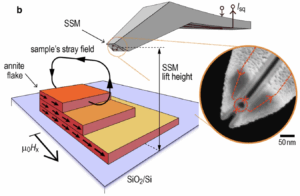 On the 2nd, Communications Materials published our paper entitled, Imaging magnetic order in a two-dimensional iron-rich phyllosilicate. Therein, we report on visualizing magnetic order in monolayers of annite, which is a fully air-stable layered magnetic mica. We used nanometer-scale scanning superconducting quantum interference device (SQUID) microscopy to directly observe domain formation in this representative of two-dimensional (2D) magnetic phyllosilicates. Because 2D magnetic micas are fully air-stable, have a large band-gap, and are high-k vdW insulators, they could be integrated into magnetoresistive tunnel junctions, magnetic random access memories, spin transistors, and nano-scale sensors. In addition, because many phyllosilicates are bio-compatible and bio-degradable, further understanding and engineering magnetism in this material class, especially at the 2D limit, could also open avenues in bio-technologies, including in targeted drug delivery and in-vivo sensing.
On the 2nd, Communications Materials published our paper entitled, Imaging magnetic order in a two-dimensional iron-rich phyllosilicate. Therein, we report on visualizing magnetic order in monolayers of annite, which is a fully air-stable layered magnetic mica. We used nanometer-scale scanning superconducting quantum interference device (SQUID) microscopy to directly observe domain formation in this representative of two-dimensional (2D) magnetic phyllosilicates. Because 2D magnetic micas are fully air-stable, have a large band-gap, and are high-k vdW insulators, they could be integrated into magnetoresistive tunnel junctions, magnetic random access memories, spin transistors, and nano-scale sensors. In addition, because many phyllosilicates are bio-compatible and bio-degradable, further understanding and engineering magnetism in this material class, especially at the 2D limit, could also open avenues in bio-technologies, including in targeted drug delivery and in-vivo sensing.
The work represents a collaboration with the group of Prof. Aleksandar Matković (Leoben, Austria) and his associates. From our group, Ph.D. students Andriani Vervelaki and Daniel Jetter as well as post-doctoral researcher Dr. Kousik Bagani performed the scanning SQUID microscopy and collected the data. Kousik initiated the collaboration and Prof. Poggio supervised the work in Basel.
September 2025
SNI Annual Meeting
From the 10th to the 12th, Ph.D. students Lukas Schneider and Luca Forrer along with Prof. Poggio attended the Swiss Nanoscience Institute’s Annual Meeting on the Lake of Hallwil in the Canton Aargau. Lukas and Luca both presented posters on their work and Prof. Poggio hosted the proceedings as SNI Director.
Katharina Speaks in Zürich
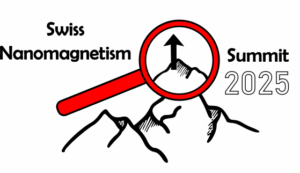 On afternoon of the 9th, Ph.D. student Katharina Kress gave a talk at the Swiss Nanomagnetism Summit in Zürich, Switzerland. The workshop brought together researchers from Switzerland and abroad working on predicting, creating, and measuring novel functionalities in spintronic and nanomagnetic systems. This two-day event, on Monday the 8th and Tuesday the 9th, took place on the campus of ETH Zürich. Katharina’s talk was entitled, “Imaging the magnetic order in a ferromagnetic monolayer”.
On afternoon of the 9th, Ph.D. student Katharina Kress gave a talk at the Swiss Nanomagnetism Summit in Zürich, Switzerland. The workshop brought together researchers from Switzerland and abroad working on predicting, creating, and measuring novel functionalities in spintronic and nanomagnetic systems. This two-day event, on Monday the 8th and Tuesday the 9th, took place on the campus of ETH Zürich. Katharina’s talk was entitled, “Imaging the magnetic order in a ferromagnetic monolayer”.
Rounak Starts as Post-doc
On the 1st, Dr. Rounak Jha started as a post-doctoral researcher in the group. Rounak earned his Bachelors and Masters in Physics from the Indian Institute of Science Education and Research Pune in 2021. He then came to Switzerland to do his Ph.D. in Physics at the École Polytechnique Fédérale de Lausanne (EPFL) supervised by Prof. Mitali Banerjee from EPFL and Prof. Christian Schönenberger from Basel. He earned his degree in the summer of 2025. Welcome Rounak!
